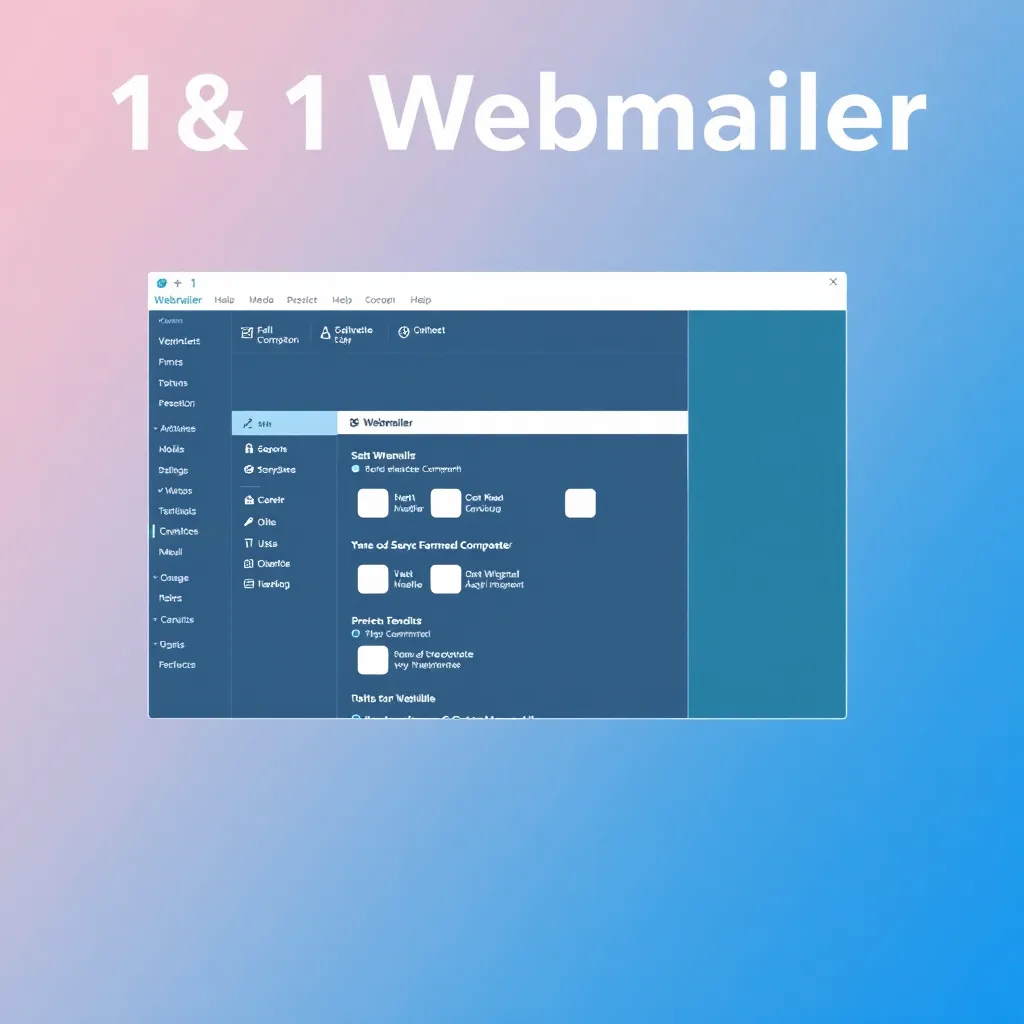Whether you are a beginner or an online entrepreneur - anyone who uses web hosting often faces the same challenges. This article answers typical Webhosting questionsthat arise before launching or expanding a website and offers practical recommendations for 2025.
Key points
- Web hosting is the technical basis of every website.
- There are various Hosting types with individual benefits.
- Performancesecurity and support are decisive selection criteria.
- A Reliable backup protects against data loss.
- Good hosting has a positive effect on the SEO of your website.

What is web hosting - simply explained
Web hosting means that your website files - texts, images and structures - are stored on a server that is accessible around the clock. This storage space is provided by a hosting provider. As soon as someone enters your domain, the server loads the content and displays it in the browser. In addition to hosting, you also need your own domain for operation. Further details on the technical basis and choice of provider can be found in the article Understanding web hosting.
Which form of hosting is right for me?
The choice of hosting depends on your requirements. A shared hosting package is often sufficient for private blogs or small companies. If you want more performance or security, go for VPS or even dedicated hosting. Cloud hosting offers high flexibility for high visitor volumes. Managed WordPress hosting is available especially for WordPress applications.

Costs at a glance
Prices vary greatly depending on the hosting type:
| Hosting type | Typical monthly costs | Suitable for |
|---|---|---|
| shared hosting | 2-10 € | Blogger, Beginner |
| VPS Hosting | 15-50 € | Smaller companies, stores |
| dedicated server | 80-400 € | Large portals, agencies |
| cloud hosting | 10-200 € | Growth pages with traffic peaks |
| Managed WordPress hosting | 20-70 € | Content websites with a focus on WordPress |
What is the difference between web hosting and domains?
The domain is your digital address - the name that users enter in the browser. Web hosting is the place where your content is stored. You need both to be present online. Many providers offer a combination of hosting and domain in one tariff.

How do I find the right hoster?
A good provider not only offers attractive prices, but also reliable support and high availability. Look out for at least 99.9 % Uptime. An intuitive dashboard simplifies administration. At the same time, the offer should be able to grow with your website - keyword: scalability. I often base my selection on this Hosting guide for technology and selection.
What does Uptime Guarantee mean?
With this note, the provider guarantees that your site is rarely offline. A mere 100 % uptime is unrealistic. A guarantee of 99.9 % corresponds to approximately 8.7 hours of downtime per year. Providers with 99.99 % are even better, because here the permissible downtime is less than 1 hour per year. It is also important to check whether compensation is provided for longer outages.

Do I need technical knowledge?
Many providers also allow beginners to operate a website. Thanks to control panels such as cPanel or Plesk, you can install WordPress, set up email addresses or start backups with just a few clicks. Advanced users benefit from more setting options with VPS or dedicated hosting - but need more knowledge to do so.
What do cPanel and co. do?
cPanel supports you with daily website tasks. These include domain administration, database access and e-mail management. A particularly attractive advantage: a simple user interface, even for non-technical users. In addition, cPanel reduces the maintenance effort, for example through automatic updates.
Security standards for web hosting
Good providers actively protect your website. In addition to free SSL certificates, regular backups are essential. Firewalls, monitoring systems and malware scanners are also minimum standards in 2025. I only choose hosting packages with integrated DDoS protection. This significantly reduces the risk of attacks.

Why SSD hosting makes sense
Compared to HDDs, SSDs read content up to 10 times faster. This speed is reflected in the performance of your site - especially during traffic peaks. SSDs are also quieter, more energy-efficient and more robust against shocks. Many modern hosting offers therefore rely on pure SSD infrastructure.
Convenient integration of e-mail hosting
With a suitable hosting solution, you will receive email addresses with your domain, e.g. kontakt@meinprojekt.de. Access is classic via webmail, Outlook or smartphone via IMAP/POP3. Some providers limit the number of mailboxes or storage. If you need a lot of accounts, you should explicitly look out for generous limits.
Linux or Windows web hosting?
For common content management systems (CMS) such as WordPress or Joomla, a Linux server. PHP, MySQL and other web services run smoothly here. Special Microsoft applications, on the other hand, require Windows hosting with ASP.NET or MS SQL. For the vast majority of projects, Linux is more data- and cost-efficient.

Support makes the difference
In the event of a problem, every minute counts. Good hosting support responds quickly - via live chat, email or telephone. When making my selection, I look for guaranteed response times and German-speaking technicians. A well-documented help center also makes administration easier - regardless of the time or weekend.
What does a CDN do?
A content delivery network distributes your website across many servers worldwide. Advantage: Content such as images or videos load faster, especially for visitors outside Europe. CDNs therefore not only improve Loading timesbut also reliability. Many premium hosters offer direct integration - some even free of charge.
Are backups really necessary?
One faulty update - and your website is gone? Not with a reliable backup system. I always make sure that automatic, daily backups are made. It should also be possible to restore them yourself at short notice. Some providers charge extra for this, others integrate backups completely into their packages.
Managed vs. unmanaged hosting
If you want to save time, choose managed hosting. The provider takes care of administration, maintenance and security updates. Ideal for companies or agencies without an IT department. Tech-savvy users prefer unmanaged hosting and retain complete control, for example over individual software or server configuration.
How does hosting affect my SEO?
Four central hosting factors play a role at Google:
- Loading time has a direct impact on rankings.
- Availability ensures better crawl rates.
- SSL encryption has long been a ranking factor.
- Reputable IP neighbors prevent penalties by Google.
I have measurably accelerated my site and increased its visibility by changing host. More about this in the article Frequently asked questions about web hosting.
Legal aspects and data protection (GDPR)
Choosing the right host is not just a technical question, but also a legal one. If your website processes personal data, it is subject to the provisions of the General Data Protection Regulation (GDPR) in Europe. This means that your data must be stored with a host that complies with the legal requirements and has implemented secure data processing procedures. Many web hosting companies already offer standardized contracts for commissioned data processing. Make sure that your provider has a transparent concept for data protection, security updates and data processing in the EU. It is also worth checking server locations, as these can play a significant role in terms of compliance.
Reseller hosting - an opportunity for agencies
Reseller hosting enables agencies and service providers to resell hosting packages under their own label. This allows you to offer customers the right web space in addition to web design or marketing. The big advantage: you retain full control over performance and support, while the technical resources are provided in the background by the actual hoster. This gives the customer the feeling of receiving everything from a single source. Reseller hosting is therefore an interesting step, especially for smaller agencies without their own server capacities. Tip: Make sure that the hoster offers a white label solution and comprehensive support so that you can help your customers in the best possible way.
Strategic selection of tools and plugins
The integration of tools and plugins also plays an important role in your web hosting decision. A good hosting environment should always keep common scripting languages (e.g. PHP versions) up to date and comprehensively cover your CMS requirements. Whether you use WordPress, Joomla or Magento: A test or staging environment can help to safely try out updates and new plugins before they go live. This minimizes the risk of incompatibilities. With shared hosting packages in particular, you should check whether sufficient resources are available for memory-intensive plugins, such as image galleries or online stores.
Database performance and optimization
A high-performance database is a decisive factor for short loading times and a positive user experience. MySQL or MariaDB databases are standard in many hosting packages, but not all environments are equally performant. Make sure you have enough memory for your database server and a fast connection to the server hardware. Techniques such as query caching or InnoDB optimization can noticeably speed up your website for data-intensive applications such as stores, forums or larger news portals. If possible, you should regularly maintain database tables, check indices and clean up outdated entries. Shared hosting packages in particular can reach their limits if many database queries are executed simultaneously.
Domain management and redirects
Web projects often have several domains, whether for different brands, language versions or marketing campaigns. Clear management of redirects and aliases is then essential. Make sure that your hosting provider supports wildcard redirects and subdomains. This allows you to conveniently direct readers, customers or partners to parts of your website without having to start a complicated setup process for each new subdomain. If you use several domains intensively, a tariff with a strong CPU and RAM base can be useful to avoid possible performance losses.
Automated scaling - load balancers and high traffic
Automated scaling can be crucial, especially for online stores, streaming services or portals with highly fluctuating visitor numbers, so that your site does not come to its knees under high loads. Load balancing distributes user requests across several servers in order to minimize the workload. In cloud hosting environments, for example, you can book additional resources during short-term peaks and reduce them again when the workload is lower. This keeps costs calculable and ensures that your website runs smoothly and quickly, even during large advertising campaigns, product launches or seasonal peaks. Long-term growth benefits from a flexible infrastructure that adapts to your traffic.
Improve customer service with white label hosting
White label hosting can be a real added value for agencies, consultants or freelancers. This gives you your own branded environment that you can offer to customers without the hoster behind it being visible. It is managed via a central control panel that bears your logo and colors. This allows you to strengthen your own brand and at the same time put together service packages that include hosting, maintenance and other services. This business idea is ideal for generating additional income and providing customers with an all-round carefree package.
Own IP addresses - IPv4 and IPv6
A Dedicated IP address can be useful for stores or larger projects. Even if shared hosting usually runs via shared IPs, having your own IP sometimes brings small SEO advantages and more security when using SSL certificates. In addition, your provider should definitely offer support for IPv6. Although IPv4 addresses are still widely used, the future and scalability of the Internet clearly lie with IPv6. Especially in countries with limited IPv4 space, accessibility via IPv6 can be crucial. If you are expanding internationally, it is worth checking in advance whether your host provides IPv6 natively.
Real-time resource monitoring
A precise insight into the consumption of your server resources is a must these days. A hosting dashboard with real-time monitoring lets you see exactly how CPU, RAM, SSD storage and network traffic are being utilized. This allows you to react quickly if necessary, for example if an increase in page views requires more resources or a plugin unexpectedly leads to a high CPU load. A good real-time analysis is standard for many companies in order to maintain an overview - especially when several projects are running in parallel. This allows bottlenecks to be identified at an early stage and capacities to be adjusted.
Outlook: Web hosting technologies in 2026 and beyond
Modern web hosting structures are developing rapidly. Topics such as container technology (e.g. Docker) and microservices are becoming increasingly important. Instead of a classic monolith, developers are designing flexible modules that can be operated and scaled independently of each other. At the same time, ever more powerful content delivery solutions are coming onto the market that network global server locations even more intelligently. AI-based services are also likely to increase further in 2026 and the coming years. For example, machine learning algorithms can automatically detect anomalies in traffic and take countermeasures. Those who get to grips with this early on will benefit from greater flexibility, security and performance. The integration of more environmentally friendly data centers will also be a key future topic for many hosters in order to offer sustainable solutions.
Summary: How to make the smart choice
Don't make an impulsive decision in favor of the cheapest provider. Technical reliability, security, upgrades and excellent support are key criteria. Choose a web hosting offer that meets your requirements today and your ideas tomorrow. With the right setup, you can get started quickly - and grow steadily. Smart comparisons lay the foundations for a strong online presence in 2025 and beyond.



